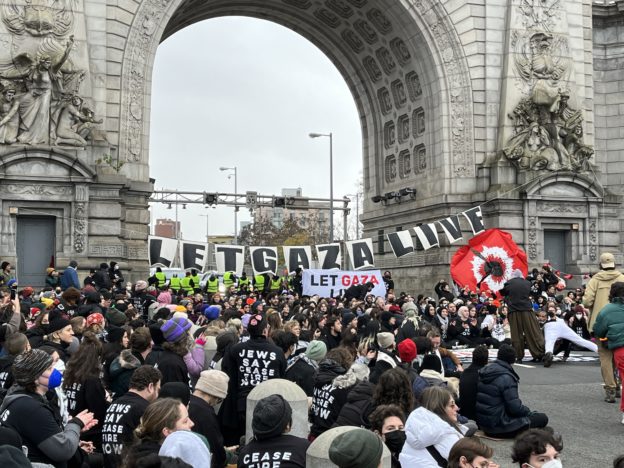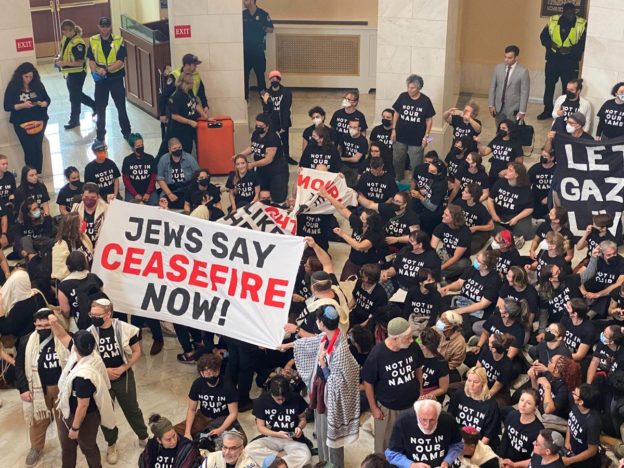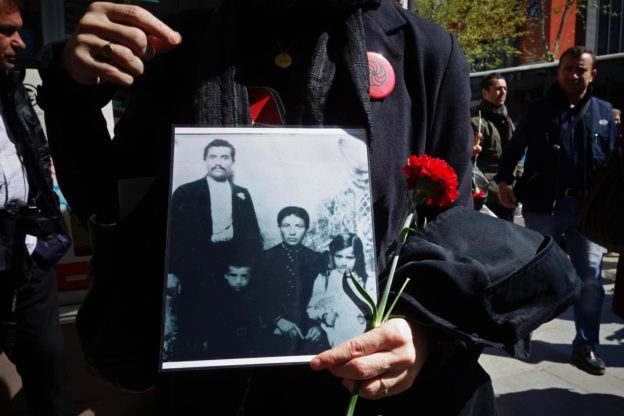Two Fronts

I have been distracted, lately cycling between rage and grief, while having difficulty sleeping. Images and stories about Israel’s horrific genocidal campaign in Gaza are the stuff of nightmares. I often think about my Armenian genocide survivor grandmother’s stories about her experiences during The Deportations. They were starving, the dead and dying were all around, and she ended up one among 8,000 orphaned Armenian children in a refugee camp in the Syrian desert on the outskirts of Ras al Ain.
I wake up in the middle of the night to check Instagram and WhatsApp to see if my friends in Gaza have posted updates or responded to my messages. I want to know whether they have survived to see another day. One of them has lost thirty pounds because of how little food there is. Another has been displaced four times and is living in a tent.
Since 2015, I have been part of the We Are Not Numbers literary mentorship program that pairs established authors with young writers in Gaza. Enas, one of my former mentees, left Gaza for the first time in her life to attend the Palestine Writes conference in September, and was unable to return home—she’s living with an aunt in New Jersey and is worrying around the clock about her family, who are displaced in Gaza with little access to clean water, adequate food, and medicine, and under constant threat of being killed in Israel’s indiscriminate bombing campaign that has to date murdered over 11,000 children. I helped raise money for Hossam, another mentee, who has a large social media presence and is therefore a particular target, to get across the border with his family, but the list is long and the wait seems interminable. I started with a new mentee, Haya, several weeks ago, and I’m sick with worry about her and Hossam. I recently worked with Haya on this moving piece about what daily life is like for her right now.
In addition to this brutal reality, repression on the Columbia and Barnard campuse are entirely bonkers, and my spouse James, who has been teaching at Columbia for over thirty years, is spending hours writing letters to the new “Task Force on Anti-Semitism.” This task force includes no actual experts on the subject—and there are a few of those on the faculty who might have been invited to join. The task force is co-chaired by known Israel boosters, and when James asked them how they define anti-semitism, they replied that they don’t have a definition. They are just getting a sense of the feelings and the vibes on the campus. Meanwhile, two weeks ago several Israeli students used a banned chemical weapon against a protest on the Quad, sending close to a dozen students to the hospital.
On the German cultural scene, it seems that collective guilt about the Holocaust has morphed into a feeling that Germany must stand by Israel no matter how genocidal the Israeli government’s actions are. An artist friend, who lives half-time in Berlin and half-time in Brooklyn, has been sending us weekly updates about the cancellations and other forms of punishment being meted out against writers and artists who call for a ceasefire or advocate for accountability. She told us about her friend the Bosnian-Serbian novelist Lana Bastašić (I read her award-winning novel CATCH THE RABBIT recently and was very impressed) who has been subject to this harsh discipline. This week I saw Lana’s principled and humane statement on Instagram, which was then published on LitHub.
It is clear that we need to be fighting on two fronts—and excuse me for using military metaphors, but this really does feel like a struggle for survival. We must redouble our calls for a ceasefire and our efforts to push the Biden Administration to stop arming, funding, and providing diplomatic cover for a genocide in Gaza. On the same day that the International Court of Justice ruled that South Africa had presented a plausible case of genocide against Israel, the U.S. government announced it was “pausing” its support for UNRWA, the largest and most effective aid agency on the ground in Gaza, increasing the threat of more deaths by hunger and disease. You can donate to UNRWA’s life-saving work here. And at the same time that we take action to stop a genocide, we must also push back against the silencing of advocacy for Palestinian freedom.
February 1, 2024




